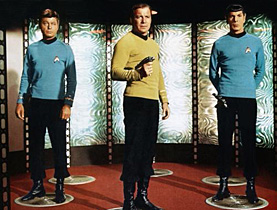Politicians chosen on face value

People are more likely to choose political candidates based on their looks thanks to an instinctive evolutionary mechanism, Swiss scientists believe.
Researchers from Lausanne University say that when choosing a leader, both adults and children employ the same inborn processes for what is an extremely complex act.
“We are using an instinctual mechanism to do something that is very sophisticated for which we haven’t really adapted or evolved,” researcher John Antonakis told swissinfo.
“We believe that this must be some kind of innate evolutionary mechanism.”
Previous research had suggested that when adults were briefly shown pictures of two unknown election candidates and asked to say which one they preferred, they chose the winning candidate more than 70 per cent of the time.
The study by Antonakis and colleague Olaf Dalgas takes this finding a step further to show that when selecting a leader, children and adults are equally beguiled by facial appearance.
Swiss adults unfamiliar with French politics were shown 57 pairs of photos of opponents from an old French parliamentary election and asked to pick which ones looked most competent.
In a separate experiment, Swiss children ages five to 13 played a computer game that enacted Odysseus’ trip from Troy to Ithaca. Then, using the same pairs of photos, researchers asked the children which candidate they would choose to captain their ship. In both experiments, the adults and children tended to pick the winners of the election – around 60 per cent of the time.
The similarity suggests that adults are using the same type of facial-inference scheme that children do when detecting leaders’ competence, the researchers claim.
Humans arrange information and store it in categories that are rapidly accessible, especially in situations where there is a lack of information or time, he explained.
“Perhaps in a couple of hundred thousand years, we won’t notice this effect as we’ll have evolved to a more sophisticated level of reasoning and rationality,” noted Antonakis.
Rational limits
The Greek philosopher Plato had similar concerns about the democratic process and the choosing of politicians almost 2,400 years ago.
“Imagine… a ship in which there is a captain who is taller and stronger than any of the crew, but he is a little deaf and has a similar infirmity in sight, and his knowledge of navigation is not much better,” he wrote in his best-known work, The Republic.
He argued that the crew couldn’t select a competent captain because it was enticed, in part, by appearances. Plato used this allegory to suggest that voters lacked the rational faculties and knowledge to elect competent rulers.
“We have very strong evidence to suggest that voters are not being as rational as we had hoped,” said Antonakis. “With these kind of negative results we can better inform voters about where there are limits of rationality in human judgement.”
Electing politicians is one of the most important decisions we make in our lives as politicians affect so many things, economic resources, healthcare and public works, he added.
Antonakis would therefore like to see greater focus at school on learning about decision-making, thought processes and logic.
“We really need to create people who think more logically, scientifically and accurately from a very young age,” he said. “In adulthood it’s very hard to get out of these instinctive routines once they’ve been ingrained.”
IQ tests for politicians?
When selecting politicians, experts say there are plenty of other more objective indicators of leadership potential including IQ, verbal fluency and ethical orientation.
“Perhaps we should give politicians IQ tests,” joked Antonakis.
“People think they take these things into account but they don’t do it enough and are biased very much by the initial categorisation that comes from the face.”
As for Switzerland, Antonakis says the country’s politicians have become more obsessed by their looks, but peope are generally less influenced by physical appearance than in lots of other countries, as they vote more regularly and are “much closer to politicians”.
And the political spectrum is very fragmented, so people tend to support parties and issues much more than individuals, he added.
swissinfo, Simon Bradley
Under Switzerland’s system of direct democracy, apart from decisions taken in parliament, voters can amend the constitution and challenge new laws using people’s initiatives and referendums.
Both can be initiated at the federal, cantonal and communal levels.
By collecting 100,000 signatures, voters can force a national vote on amending or adding to the constitution.
Between 1891 and May 2007 Swiss voters have only adopted 15 people’s initiatives.
The referendum is seen as a brake lever in the hands of the people. Laws that have been passed by parliament can be challenged by the public in a referendum.
For a referendum to take place, 50,000 signatures must be gathered within 100 days of the publication of a decree.
Women have only had the vote on a national level since 1971.
Foreigners have the right to vote in numerous cantons and communes.

In compliance with the JTI standards
More: SWI swissinfo.ch certified by the Journalism Trust Initiative




You can find an overview of ongoing debates with our journalists here . Please join us!
If you want to start a conversation about a topic raised in this article or want to report factual errors, email us at english@swissinfo.ch.